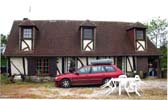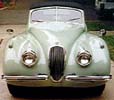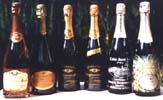



You are here: Home
   |

|
|
You are here: Home |
The recipes and other stuffThe Online Cookbook contains some stuff that has been kicking around for a decade or more, and other much newer stuff which is more like reserahc notes because I?ve become more and more experimental in the kitchen. The recipes are attempts to help you produce some of my favourite things. The trouble is that I make most of them differently each time Ė either because I want to try something slightly different or because I donít have an exact recipe at all. What follows certainly wonít teach you to cook if youíre a total beginner in the kitchen (buy Delia Smith for that). Iím assuming that anyone whoís attracted to a site like this will live in a household where someone can deliver a decent meal. However, Iíve tried to write the recipes so that you donít have to be an expert either. Some are undoubtedly trickier than others and where there are pitfalls Iíve tried to warn you. Where appropriate, Iíve given you a list of ingredients and a step-by-step sequence of instructions, but in some cases Iíve just described what I do and invited you to have a go. Basically, Iím telling you the kind of things I do, how I do them and, often, why. Itís a long time since Iíve produced anything unfit for human consumption, and my friends keep coming back to my dinner parties, so if you go along with me you should be okay. The recipes are interspersed with other bits of kitchen lore which you may find useful, interesting and/or amusing. Among other things, Iíve tried to explain in laypersonís terms some of the science behind how and why certain things work in the kitchen. This made me a bit of an adventurer back when I started, but I?ve since been overtaken by the spectacular cooking of Heston Blumenthal, Sat Bains and the like. You may wish to ignore these bits, but I hope you wonít. One of the most important things I learned from living with my father Ė who was a professional industrial chemist and became an accomplished amateur radio and electronics designer and constructor, a skilled joiner, a highly creative photographer, an excellent maker of wines and jams, and an internationally respected authority on the cultivation of cacti at different stages in his life Ė is that most of us can learn to understand most subjects, however technical they seem. All it takes is a little effort, and the rewards are considerable, whether in terms of pure interest or because a little extra knowledge actually helps you to do something Ė in this case cook Ė better. In this, Iím grateful to Harold McGee for his On Food and Cooking Ė The Science and Lore of the Kitchen. This doesnít contain recipes, but it gives you nearly 700 pages of scientific background to your cooking, eating and drinking, including a potted course in chemistry Ė a hard read, but a good one if, like me, you are as interested in the why as you are in the how. I was delighted to find that McGee is a close friend and colleague of Heston Blumenthal. And smug to know that I was reading On Food and Cooking for some years before Blumenthal became famous. Oh yes: my only other autographed cookbook is Heston?s In Search of Perfection, signed at the Fat Duck while Patricia and I were eating our way through a £500 dinner. If you find anything wrong with any of these recipes, or if you want to suggest any improvements (theyíll be acknowledged) or even contribute a recipe (so will that), please use the íContact meí button to send an email |
Personal site for Paul Marsden: frustrated writer; experimental cook and all-round foodie; amateur wine-importer; former copywriter and press-officer; former teacher, teacher-trainer, educational software developer and documenter; still a professional web-developer but mostly retired. This site was transferred in June 2005 to the Sites4Doctors Site Management System, and has been developed and maintained there ever since. 
|
|